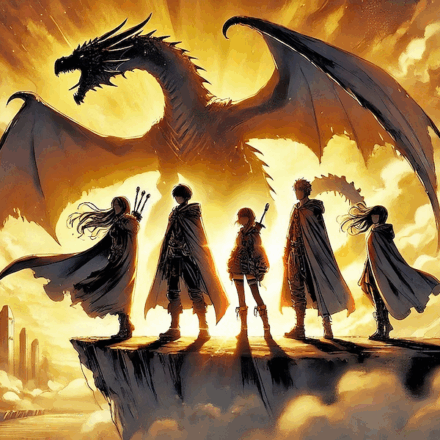This is part of a Gnome Stew double header. Click here to check out Walt’s article “Methods of Collaborative Game Mastering” for a look at collaborative GMing from a more experienced perspective.
The Game Master for one of the games that I’m currently playing in has decided he wants to step down. The group wants to see the game go on, but the GM is done. No one wants to take over full time, as we all like playing our characters and don’t want an inadvertent GMPC. We threw about some ideas and finally landed on the idea of taking turns and collaboratively GMing the game. None of us have ever done this before, but we’re working on the details of how we’ll handle the switch offs and keep the story in tact. Here’s what we’re thinking about how to do it.
Taking Turns
Each player will GM, for2 to 3 sessions at least. This should prevent burnout and having people just running one-shots without much plot development.
An Over-arching Plot
While we all have character goals to focus on, we all want there to be some overarching plot to the story. Otherwise, it might feel like doing a whole bunch of one-shots without any real purpose. While this can be fun, we’ve all been itching for a good long-term game.
Last GM picks next story arc, but the players all agree on it
The last person to have done the work of GMing gets to set up the initial theme of the next GM’s story. This one might be a little tricky. That’s why we’re instituting an “all players agree on it” rule. If the last GM says they want to have their PC raid the lair of their arch nemesis that is one thing, but it could easily fall into GMPC territory, or constantly rotating character focus. That’s not a bad thing at all, but could go a bit awry in the implementation.
Set amount of experience each game, no matter who GMs
No matter who is GMing or what happens, each game each player (GM Included) gets a set amount of experience. While this will remove some of the merit based experience awards, it will help keep people on the same level, even if they haven’t gotten to play.
Structure of the group allows for characters to leave and come back
We aren’t sure if we’re going to have players keep their characters while GMing, or put them out to pasture, ala Mark in the gamers. Some characters (the combat or techy ones) might be necessary to overcome certain challenges. What do you think is the best way? We want to leave the structure of the in-game group such that it is possible for characters to leave at will.
When a person is GMing, they are The one and only GM
And finally, for the sake of this discussion, the person GMing is the one and only GM at the time. Even if a previous GM introduced an element and thinks it is being used incorrectly, its not their game and not in their control. Issues can be brought up, but shouldn’t be brought up during play or at the table.
So, this is how we’re going to approach our first attempt at collaborative GMing. To those who have had experience with collaborative GMing, what advice do you have?

















Characters leaving and coming back can be a problem. If the GM plays his/her character, you maintain continuity, but it gives the DM one more thing to worry about and may shade the actions of the team a bit. On the other hand, characters coming and going can be complicated if you happen to be in the middle of an adventure (or story arc) at the time of the character’s absence/arrival. You need to have some standing orders specifying how it will be handled. Either appoint someone to run the GM’s character (maybe the GM himself) or the missing player’s character in the event of an absence, require that PCs only enter/exit the game at specific points in the story (beginning of a new adventure, for example), or allow the GM to treat the PC as an NPC and involve or exclude the character at his discretion based on the needs of the story or campaign.
From the GM’s perspective, I find it challenging and fun to design adventures that fit the group’s chemistry, so I don’t require the team to have a priest or fighter in the party, for example. Our current D&D group has made it to a very high level without a priest, although we have relied on potions or the occasional NPC hireling a few times. And adventures that are heavy on the undead really make us crap our pants, but we usually get through them ok. (Besides, it’s good for the PCs to have to run away once in awhile, if only to remind them of their own mortality.) If you run a lot of published adventures, such alterations could be a real pain in the butt. However, if you design the adventures yourself, you can play to the character’s strengths (and occasionally exploit their weaknesses, just to keep them humble).
I did a game like this a couple years ago and it was among the best games I’d ever played.
We were a little less anal about overarching plot than what you had in your outline. The first few games were oen shots, but as we got used to it we started making longer plot arches. It definitely took some getting used to, but once we learned to leave threads dangling instead of closing off everything, we left more for the other GMs to use. By the end it ran like any long running game with an uber plot.
We made leveling simple. Each time a GM finishes, that’s a level. GMs ran 2-4 session stories. It worked out real well.
We tried going with wealth by level, but IMHO we were underlooted. Nobody wanted to be the jerk who gave out that one piece of equipment no other GM wanted to deal with, so we all gave out relatively weak loot. If we had to do it again I’d insist on giving out gold according to WBL and letting players buy and sell as needed.
By far the best thing we did for this game was keep it all on a wiki. Everyone needed to be able to see the other character sheets. Some of us even published the campaign material we wrote up as we went, though it rarely mattered.
@pseudodragon – My two big concerns are some of the people who are newer to GMing doing too much of the inadvertent GMPC, and the disruption that not having your tank, or speaky character or spellcaster could cause. We’re only going to end GMing turns on the end of story arcs, so we shouldn’t ever have a “person disappears in the middle of combat” scenario. I definitely hope everyone takes your “design adventures that fit the group’s chemistry” advice.
@valadil – “I did a game like this a couple years ago and it was among the best games I’d ever played.” I’m glad to hear that! If it works out with this game, I may resurrect my one of my old Eberron games with this format. It got handed to me by the last GM, and then I brought it to a semi-quick conclusion, but doing a round robin thing might make that game run for a lot longer.
John,
One thing to keep in mind when tag-teaming; if you are replacing characters (Joe the Fighter was with the party for the Assault against the Plaid Dragon, but left the party while Dani the Avenger joined for the Dungeon of Dissection), then you’ll want to make sure that Joe advances in power and goodies as if he had been on the adventure.
The only multi-DM game I’ve ever played was one evening of total ad-libbing, rotating the DM chair every half hour (actually using a countdown timer in the middle of the table). So I can’t really give much advice there.
What I can suggest, though, is an effective solution to the DMPC thing — at least, it was effective in our last campaign, where only 1 out of 10 sessions could be attended by every single player in the party. What we did was have the PC trod along, but not take part in any social interactions or direct combat. What I did allow (I was the only DM at that time) was that other players could call upon character-specific services (e.g. the Cleric would heal, the Rogue would look for traps, etc), unless it would disadvantage the PC.
Of course, in your case, since the original player of the PC *is* present, you could allow roleplaying to be done by the DM himself (and thus make it a fluff-DMPC), and leave the tactical decisions and skill/ability-uses to the other PCs (within limits, obviously).
It’s good that you’re aware of GMPC problems, but I’ve found that rotating GMs are often very good about scooting their character to the background when they’re running. Enlisting someone to run your character might be useful if you’re playing a spellcaster in 3.x– if only because it takes so long when a player’s deciding what to do that you won’t have the time to do it right while you’re running the bad guys too.
An alternative to xp and/or loot off screen would be to boost the xp and/or loot on screen. That way the GM’s character would catch up before their next stint at GMing.
I’d probably go with xp off screen, and extra loot (figure the loot as if there were N+1 players, where N is the number of players) on screen.
Each GM could be tasked with coming up with a level appropriate loot that perfectly fits the previous GM’s character. If you use player “Loot Wish Lists,” it could just be an item from the list.
@Walt Ciechanowski – We’re actually going to ditch the XP as it is now, and do a set amount each session for each character, no matter what. That should hopefully solve the progression issue.
@Sektor – That sounds awesome. You know, I think I might suggest that. Take the first session and have us all take 1/2 hour telling the backstory of the the campaign. Get a stenographer, and we’re all set! Awesome idea!
@Scott Martin – I am a little worried about the GMpc, but in one main regard. One person hasn’t done a lot of GMing and questions her own skills. She’s great at making characters and I think it will be easy to fall back on the habits of playing.
@Nojo – That is an issue I hadn’t thought of. Loot, if a character leaves while being played, will be hard to acquire. Especially if one GM runs a monty haul session. We’ll have to work it into the social contract that the characters should have reason for sharing the loot. The idea of a player loot wish list is awesome as well! I think I may write something about that concept, if you’re cool with it.